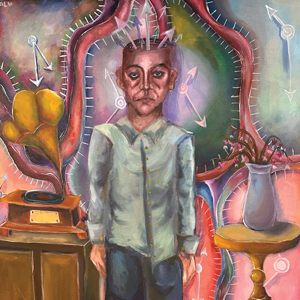lebo bookshelf
In June, when there were rainbows for Pride month everywhere, a friend of mine posted on Facebook about a conversation he had with his 7-year-old son, explaining that parades and celebrations of LGBTQ life are about not being ashamed to be who you are in a world that sometimes would prefer certain people to be invisible. His son replied, “Well, shouldn’t every day be Pride day then?” It should. So, I bring you a children’s selection this month from Mt. Lebanon Public Library’s excellent display for Pride month—In Our Mothers’ House, by Patricia Polacco.
 I had planned also to discuss an LGBTQ-themed book for adults but found I couldn’t get Shanti Sekaram’s newest novel, Lucky Boy, out of my head, so I’m sharing it with you instead. What ties Lucky Boy together with In Our Mothers’ House isn’t sexuality, but family. Sekaram’s prose shines with uncommon lucidity and grace, as the book begins with the overwhelming desire for a child that strikes Kavya, a 30-something chef who lives comfortably with her husband, Rishi, in Berkeley, California, a seeming paradise of natural food and bicycle commuting. She and her husband pursue every avenue to become parents before falling in love with Ignacio, a toddler in foster care they hope to adopt.
I had planned also to discuss an LGBTQ-themed book for adults but found I couldn’t get Shanti Sekaram’s newest novel, Lucky Boy, out of my head, so I’m sharing it with you instead. What ties Lucky Boy together with In Our Mothers’ House isn’t sexuality, but family. Sekaram’s prose shines with uncommon lucidity and grace, as the book begins with the overwhelming desire for a child that strikes Kavya, a 30-something chef who lives comfortably with her husband, Rishi, in Berkeley, California, a seeming paradise of natural food and bicycle commuting. She and her husband pursue every avenue to become parents before falling in love with Ignacio, a toddler in foster care they hope to adopt.
Ignacio grows and thrives with the Reddys despite the painful truth that his biological mother, Soli, who was taken into custody as an undocumented immigrant, is nearby and desperate to return to him. Soli’s time in a detention facility shines a light on the devastating wake of immigration policy, as the stakes are incalculably high for Soli with the custody of her son on the line. Every capricious guard and every missed connection is rendered so evocatively that the only thing harder than turning the page was putting the book down and not knowing what was happening to her.
As Soli, Ignacio, Kavya, and Rishi’s stories unfold, the author articulates with vivid insight the unsayable truth of love: to be, as she puts it, at the world’s mercy when you are powerless to safeguard those closest to you. As more of Soli’s story was revealed—how she came to the United States and will fight for her son—my heart broke again and again at just how much at the mercy of the world she had been, and would continue to be.
At the mercy of the world, too, are Kavya with her “perfect” Berkeley life and Rishi, with his ambivalence about his career. So, too, are all of us in this world where hearts are riven by love. The stunning thing about Lucky Boy is how beautifully Sekaram speaks to love of all kinds: the quiet way that the Reddys complete each other, the fierce infatuation Soli experiences with Ignacio’s father, the bodily longing both Kavya and Soli feel for Ignacio when they cannot be with him. Most incredible is the way the book simply invites us into the life of this lucky boy, Ignacio El Viento Castro Valdez. Just as the world is full of ambivalence and miracle, there are no easy answers to the questions he and his mothers, both biological and foster, will face. Like the wind he is named for, his journeys will not be tamed, and his life will not be simple. But there is so much to learn in the meantime.
In Our Mothers’ House by Patricia Polacco, also takes family love for a theme (and takes place in Berkeley). It is a simple pleasure and a deeply joyful book about two moms and their rainbow of three adopted children. From the opening lines where the narrator talks about how her mothers “walked across dry hot deserts, sailed through turbulent seas, flew over tall mountains and trekked through fierce storms” just to bring her home, there is nothing that these two women cannot and will not do for their children. Meema is tall and thin; Marmee is short and stout. They throw block parties and build treehouses and even dress up in fancy hats and dresses for their daughters’mother-daughter tea party, even though they never ever wear dresses. Told by the oldest sister, we meet middle brother Will and baby sister Millie, unfailingly dedicated to one another and their life together, all held together in their big noisy house. Their Italian grampa makes gnocchi, and they all (and their children after them) learn to walk in front of the big fireplace at the center of the house.
Their world is not perfect. At their diverse neighborhood block party, one lady denounces Marmee and Meema for “what you two are.” But other neighbors encircle the family with more love. Their peace will not be broken. It is, maybe, a testament to our trying times that a simple children’s book about people of different identities and races throwing a party together could bring me to sentimental tears. If Lucky Boy is a story of family love in all of its complexity, In Our Mothers’ House is a generous story about just how simple things sometimes can be, and how pure a form love can take—in all its forms.
Questions for conversation:
» When have you been overtaken by the power of your feelings?
» When have you stood at a crossroads, where grief awaits in both directions, but
also pure joy and beauty?
» When have your doubts been silenced by a deep and powerful truth?
» Where does your heart find peace? Is there a place, like In Our Mothers’ House,
where the walls whisper the names of those you love?





